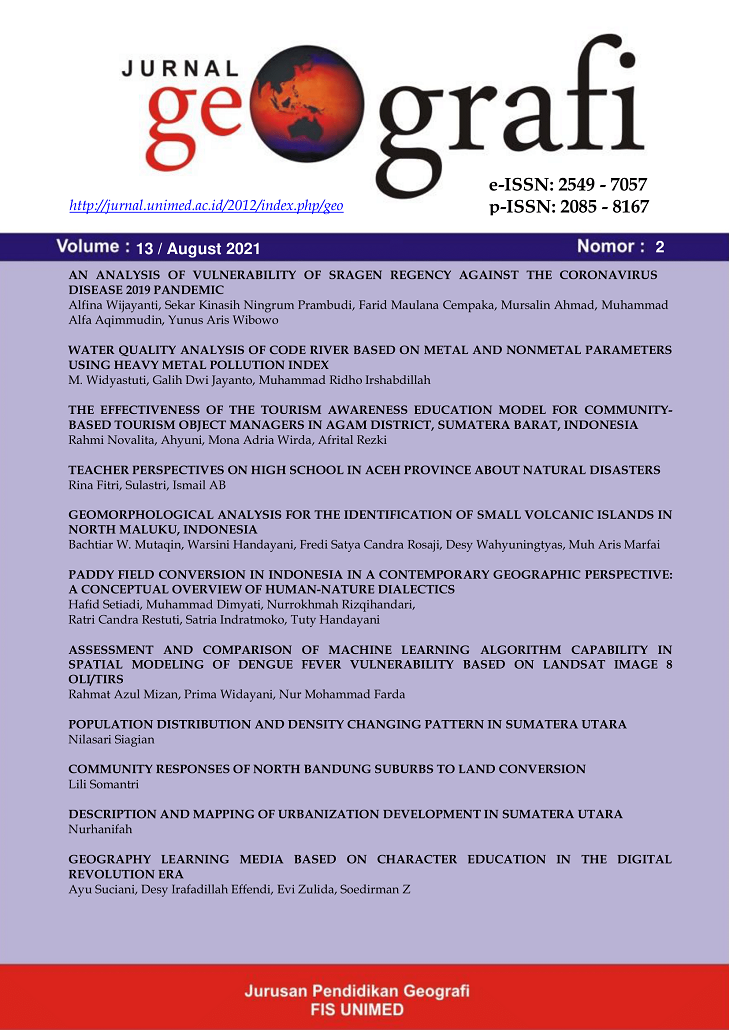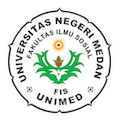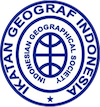POPULATION DISTRIBUTION AND DENSITY CHANGING PATTERN IN SUMATERA UTARA
DOI:
https://doi.org/10.24114/jg.v13i2.25428Abstract
The purpose of this study was to determine the distribution of population density descriptions and patterns of change in North Sumatra. This type of research is library research (Library Research). Data collection techniques are carried out by utilizing existing facilities in the library, such as books, magazines, documents, secondary data records, statistical data, or pure library research related to the object of research. The analytical method provides a clear, objective, systematic, analytical, and critical description and description of the distribution and population density description: characteristics and patterns of change in North Sumatra. The initial step is achieved by collecting the required data, classifying it, describing it, and then analyzing it. The results of this study explain that the distribution pattern and population density that occur are caused by spatial characteristics and geological changes. When viewed from the aspect of population density. The high population density in North Sumatra causes social problems such as congestion, poverty, health services, crime rates, settlements, unhealthy living environments, and others. The pattern of population distribution that occurs is geographical. The largest distribution is still throughout the East Coast region, wherein that region there are the largest number of districts (above 5% of the province's population).Keywords: Population, Distribution, Density, SpatialReferences
Aljoufie, M. (2021). The Impact Assessment of Increasing Population Density on Jeddah Road Transportation Using SpatialTemporal Analysis. Sustainability, 35 (1445).
BaÅŸkan, A. H., Zorba, E., & Bayrakdar, A. (2017). Impact of the population density on quality of life. Journal of Human Sciences, 14(1), 506.
BaÅŸkan, A. H., Zorba, E., & Bayrakdar, A. (2017). Impact of the population density on quality of life. Journal of Human Sciences, 14(1), 506-518.
Chen, L., Jie, F., & Wẹi, S. (2012). Population distribution and influencing factors based on ESDA. Chinese Journal of Population Resources and Environment, 10(3), 47“53.
Chen, R., Yan, H., Liu, F., Du, W., & Yang, Y. (2020). Multiple global population datasets: Differences and spatial distribution characteristics. ISPRS International Journal of Geo-Information, 9(11).
Gutiérrez Chacón, E., Moral-Benito, E., OtoPeralias, D., & Ramos, R. (2020). The Spatial Distribution of Population in Spain: An Anomaly in European Perspective. SSRN Electronic Journal.
Hummel. D. (2020). The effects of population and housing density in urban areas on income in the United States. Local Economy, Vol. 35(1) 27“47.
Kumar, M. (2015). A Study of Population Distribution. Int J Latest Technol Eng Manag Appl Sci, IV(Iii), 24“28.
Linard, C., Gilbert, M., Snow, R. W., Noor, A. M., & Tatem, A. J. (2012). Population distribution, settlement patterns and accessibility across Africa in 2010. PLoS ONE, 7(2).
Malik, I. B. I., & Dewancker, B. J. (2018). Identification of population growth and distribution, based on urban zone functions. Sustainability (Switzerland), 10(4), 1“13.
Mohammed Hamud, A., Mobarak Prince, H., & Zulhaidi Shafri, H. (2019). Landuse/Landcover mapping and monitoring using Remote sensing and GIS with environmental integration. IOP Conference Series: Earth and Environmental Science, 357(1).
Pavlic, I., Portolan, A., & Butorac, M. (2013). Urban tourism towards sustainable development. IJMBS (International Journal of Multidisciplinarity in Business and Science), 1(1), 72“79.
Pequeno P, Mendel B, Rosa C, Bosholn M, Souza JL, Baccaro F, Barbosa R, Magnusson W. (2020). Air transportation, population density and temperature predict the spread of COVID-19 in Brazil.
Purnama, H., Gunarto, T., & Budiarty, I. (2020). Effects of energy consumption, economic growth and urbanization on indonesian environmental quality. International Journal of Energy Economics and Policy, 10(6), 580“587.
Putri, R. F., Abadi, A. W., & Tastian, N. F. (2020). Impacts of Population Density for Landuse Assessment in Cengkareng, West Jakarta. Journal of Geoscience, Engineering, Environment, and Technology, 5(2), 56“67.
Ratih Fitria Putri, Aji Wijaya Abadi, Naufal Fattah Tastian. (2020). Impacts of Population Density for Landuse Assessment in Cengkareng, West Jakarta. Journal of Geoscience, Engineering, Environment, and Technology, 5, (2), 56-67
Ribeiro, H. V., Oehlers, M., Moreno-Monroy, A. I., Kropp, J. P., & Rybski, D. (2021). Association between population distribution and urban GDP scaling. PLoS ONE, 16(1 January), 1“15.
Romdhoni, M. F. (2020). The Use of Landsat Image and Census Data for Modelling Population Density and Urban Density in Palembang, Indonesia. Journal of Architectural Research and Design Studies, 4(2).
Syazili, A., & Bakti, A. M. (2020). Population Distribution Information System in Tugumulyo District. Journal of Information Systems and Informatics, 2(1), 123“130.
Yi Shi , Junyan Yang, and Peiyu Shen. (2020). Revealing the Correlation between Population Density and the Spatial Distribution of Urban Public Service Facilities with Mobile Phone Data. ISPRS International Journal of Geo-Information, 9, (38), 1-17.










